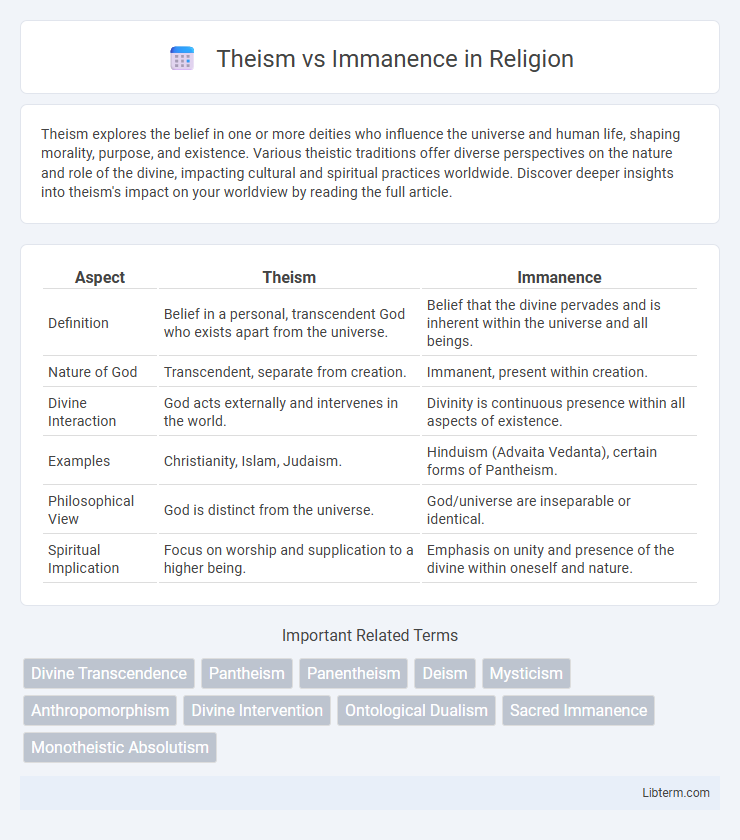Theism explores the belief in one or more deities who influence the universe and human life, shaping morality, purpose, and existence. Various theistic traditions offer diverse perspectives on the nature and role of the divine, impacting cultural and spiritual practices worldwide. Discover deeper insights into theism's impact on your worldview by reading the full article.
Table of Comparison
| Aspect | Theism | Immanence |
|---|---|---|
| Definition | Belief in a personal, transcendent God who exists apart from the universe. | Belief that the divine pervades and is inherent within the universe and all beings. |
| Nature of God | Transcendent, separate from creation. | Immanent, present within creation. |
| Divine Interaction | God acts externally and intervenes in the world. | Divinity is continuous presence within all aspects of existence. |
| Examples | Christianity, Islam, Judaism. | Hinduism (Advaita Vedanta), certain forms of Pantheism. |
| Philosophical View | God is distinct from the universe. | God/universe are inseparable or identical. |
| Spiritual Implication | Focus on worship and supplication to a higher being. | Emphasis on unity and presence of the divine within oneself and nature. |
Understanding Theism: Core Concepts
Theism centers on the belief in a personal, transcendent deity who actively governs the universe and engages with creation through intervention and revelation. Key concepts include divine omnipotence, omniscience, and moral authority, where God exists beyond and independent from the material world. This contrasts with immanence, which emphasizes the divine presence within the universe and all beings rather than a separate, external creator.
Defining Immanence in Spiritual Thought
Immanence in spiritual thought refers to the belief that the divine pervades and is present within the material world, emphasizing an intrinsic connection between God or ultimate reality and the universe. This concept contrasts with theism's transcendence, where God exists independently and above creation. Philosophers like Baruch Spinoza and theologians in panentheistic traditions highlight immanence as the foundation for understanding spirituality as an intimate, ongoing presence rather than a distant, external force.
Historical Origins of Theism and Immanence
Theism originated in ancient religious traditions, characterized by belief in a personal, transcendent God who creates and governs the universe, evident in early Mesopotamian, Hebrew, and Greco-Roman theology. Immanence, contrastingly, stems from Eastern and mystical philosophies like Hinduism and Neoplatonism, emphasizing the divine presence within the material world and human experience. Historical developments show theism's focus on a separate divine entity while immanence highlights interconnectedness and the inherent divinity permeating all existence.
Key Differences: Theism vs Immanence
Theism centers on a personal, transcendent deity who created and governs the universe, whereas immanence emphasizes the divine presence existing within and throughout the natural world. Theism often involves belief in a separate, supernatural God who intervenes in human affairs, while immanence sees divinity as inherently part of all beings and matter, without separation. Key differences lie in the nature of God's presence--external and distinct in theism versus internal and pervasive in immanence.
The Role of God in Theistic Belief Systems
Theistic belief systems emphasize God as a transcendent, personal being who actively creates, sustains, and governs the universe, embodying omnipotence, omniscience, and omnibenevolence. God's role includes moral authority and providential intervention, guiding human destiny and offering a foundation for faith and worship within various religious traditions such as Christianity, Islam, and Judaism. This contrasts sharply with immanence, where divinity is understood as inherent within the universe rather than as a separate, controlling entity.
Manifestations of the Divine in Immanence
Immanence emphasizes the presence of the divine within the natural world and individual experience, highlighting manifestations such as spiritual energy, consciousness, and sacredness in everyday life. Unlike Theism, which often portrays God as a transcendent and separate entity, Immanence sees the divine as an inherent, pervasive force manifesting through nature, human creativity, and moral intuition. These immanent manifestations foster a direct, personal connection to the divine without intermediary structures.
Philosophical Arguments: Transcendence and Immanence
Philosophical arguments on theism emphasize divine transcendence, portraying God as an ultimate, infinite being existing beyond the physical universe and human comprehension. In contrast, immanence argues that the divine pervades the material world, suggesting that God is inherently present within all aspects of nature and human experience. This debate centers on whether the sacred is wholly separate from or intrinsically connected to the cosmos, influencing metaphysical, epistemological, and theological frameworks.
Theism and Immanence in World Religions
Theism, characterized by belief in a transcendent, personal God, is central to religions like Christianity, Islam, and Judaism, emphasizing a creator who exists beyond the universe. Immanence, highlighting the divine presence within the universe and its beings, is a key concept in Hinduism, Buddhism, and indigenous spiritualities, where the sacred permeates all existence. These contrasting views shape religious practices, theology, and the understanding of the divine's relationship to the world across various faith traditions.
Critiques and Challenges to Each Perspective
Theism faces critiques for positing a transcendent deity that can seem disconnected from empirical evidence and the problem of evil, challenging the coherence of an all-powerful, benevolent God. Immanence is often criticized for potentially diminishing the divine to mere natural processes, risking a pantheistic or atheistic interpretation that may undermine personal spirituality and religious experiences. Both perspectives encounter philosophical challenges regarding the nature of divine interaction with the world and the limits of human understanding about ultimate reality.
Contemporary Relevance: Theism and Immanence in Modern Society
Theism, emphasizing a transcendent deity, remains influential in shaping moral frameworks and community values in contemporary society. Immanence, highlighting the divine presence within the material world, resonates with modern spiritual movements that prioritize personal experience and ecological awareness. Both perspectives contribute to ongoing dialogues on spirituality, ethics, and the human relationship with nature in a rapidly evolving cultural landscape.
Theism Infographic

 libterm.com
libterm.com